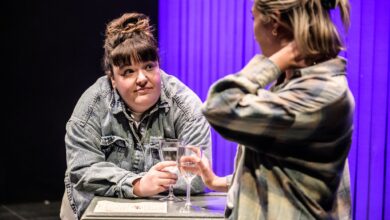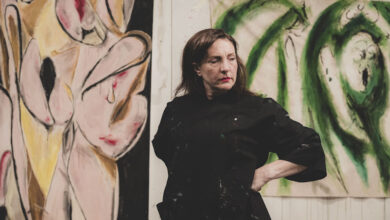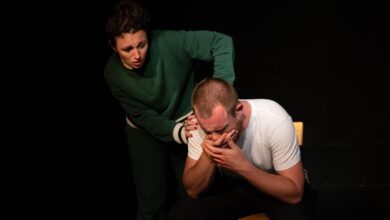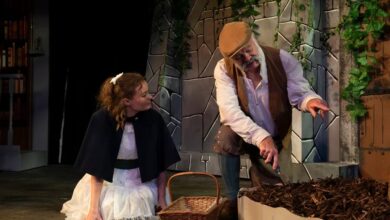Review: Animal, Park Theatre
Hits all the right spots and is a perfect representation of online dating for those with complex and challenging needs. summary
Rating
Unmissable!
David (Christopher John-Slater) has severe cerebral palsy and struggles with daily activities such as eating and drinking, let alone relieving himself of sexual desires. These, then, cause great stress, frequent outbursts of frustration and have significant impact on those around him. Animal takes us through David’s online dating journey, the different types of men he comes across, and encounters that resonate not only with those that have complex needs, but also anyone who has the slightest experience with online dating.
This story, originated by Josh Hepple and penned by Jon Bradfield, is a whirlwind of an adventure, combining both intense emotional heartache and literal laugh out loud moments. On the emotional side, John-Slater’s performance is exceptional and perfectly enacts the struggles of one with cerebral palsy, as he cries out to anyone who would listen that just like everybody else he wants love, companionship and to have sexual desires. Three specific scenes are exceptionally impactful and still make me tear up thinking about them. First, when David falls from his bed and crawls on the floor, breaking the furniture in his way, as he attempts to just get himself a glass of water without assistance. Second, when David doesn’t confirm his plan to meet up with Liam (Joshua Liburd), someone he met online, the night before their ‘date’ and is ultimately stood up, because he is terrified that confirming the day before would give Liam the excuse to change his mind. Lastly, and perhaps the more unusual one, when David says he has cerebral palsy and not a disability, to which Mani (Harry Singh) responds “That’s the spirit”. While many members of the audience laughed, this was also exceptionally difficult to hear as this short response confirms to David how the rest of the world – even one of his closest friends – see him.
However, this play is not just gloom and doom. There are many very well-timed comedic parts, mostly around the absurdity of modern-day dating, some of the more unusual characters lurking on Grindr, and things one would not consider acceptable to say in-person and yet seem perfectly fine to say to a stranger online. Despite this, some of the transitions from serious to more light-hearted moments are slightly forced and it could be difficult for the audience to fully embrace a number of the jokes which occur straight after particularly heavy moments. Nonetheless, these humorous aspects are appreciated, giving the audience much needed relief from some of the more serious scenes.
Most of the sketchy Grindr dates are played by William Oxborrow, who flexes his adaptability as an actor and is able to transition into the many different characters he is given. The interactions between David and his housemate Jill (Amy Loughton) and Derek (Matt Ayleigh) are fantastically written and impressively performed by the actors. The challenges they encounter and sacrifices they make in order to look after David are highlighted and this makes the eventual confrontation between David and Jill even harder to watch as their relationship breaks down over one of David’s earlier mistakes.
The set, designed by Gregor Donnelly, is literally multi-layered. The stage has two floors, with the upper one showcasing that these are different locales. In addition, the sliding doors and windows on the ground floor also double up as canvas for projections of messages exchanged between David and other characters. This technique is used well to highlight the absurdity of the comments from online daters.
Animal is an exceptional piece of work that hits all the right spots, and is a perfect representation of online dating for those with complex and challenging needs. Accompanied by a phenomenal cast, this story highlights the importance of recognising that irrespective of one’s needs and challenges everyone deserves to be loved and respected.
Written by: Jon Bradfield
Story originated by: Josh Hepple
Directed by: Bronagh Lagan
Produced by: Daniel Cooper
Animal plays at Park Theatre untli 20 May. Further information and bookings can be found here.
You can also find an interview with writer Jon Bradfield by our reviewer on their YouTube channel here.







